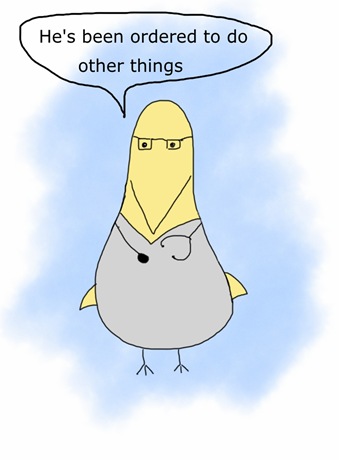I used to read left wing blogs to laugh at extremists and get annoyed with their lack of common sense and pragmatism.
Now I just go to "centre right and libertarian" blog Catallaxy instead.
Over the weekend, for example, news of
the appalling deaths in Afghanistan prompted by a grandstanding pastor of a trivially unimportant church in America, who the media should know better than give publicity to, was met by Catallaxy's nuttiest commenters (and, man, there's some competition) - CL and Michael Fisk - with calls for
more Koran burning.
CL ends
one comment with "More power to the Pastor’s right arm."
Fisk: " Burning the Koran will bring these issues to a head. We cannot afford to delay them any longer.
We must burn the Koran at once."
And, funnily enough, given that Yobbo (I forgot - he also likes the Koran burning idea) mentions it as being no worse than burning Mein Kampf, Fisk then goes on to use some distinctly Mein Kampf-ian terminology (you know, the parts that suggest that some people are "sub humans"):
That is the ethical response to the rioting of worthless sub-human animals who hate freedom.
Now, there are people in the thread calling them out (but in very mild terms, especially for that blog). In fact, you really know some at Catallaxy have gone berserk when JC starts sounding like the voice of moderation.
Yet, as far as I can see, there are no regulars there who have said the obvious - Fisk and CL are freaking nuts, and if their argument is so compelling, why weren't they taking the lead in organising Koran burnings in a public park yesterday, with media invitations to boot. (Even if the media wouldn't attend, why not post pictures on the internet?)
I mean, in this day and age, small scale protests are organised in the trivial amount of time it takes to post the time and date on a Facebook page.
I've suggested this to Yobbo some months ago when he first came up with the "burn more" idea: he said he didn't have police protection so it wasn't going to be up to him. (I think he suggested the Army could do it from their bases in Afghanistan, though!)
As for CL and Fisk: I don't know the reason for their craven cowardice in not taking the lead to organise Koran burnings. Fisk talks about the Afghanistan murders in the following context:
The first phases of any war, particularly an ideological one, will always have unfortunate victims who will be the first to fall.
There's ample opportunity to show solidarity with the victims, Fisky: why don't you go to it? Or are personally too valuable to the cause?
And as for the rest of the Catallaxy commenters - including blog controller Sinclair Davidson - no one has called out Fisk for the use of the "sub human" epithet.
And CL has the hide to suggest the fight against fundamentalist Islam is like the fight against 20th century fascism. Hey, CL, I would have thought the absolute worst aspect of some branches of 20th century fascism was not the subjugation of free speech: it was the adoption of a categorisation of some people into "sub human" - like your pal Fisky argues.
Go let us know when the Koran burning starts. It's a very Lenten thing, I'm sure.
PS - I'll delete whatever comment I like here. Offensive language is a guarantee of deletion.
I'm also still busy this week, so posts will probably be light.
PPS - Let's deal with the CL conundrum.
CL used to run his own, well written, blog, and there is no denying that he represents to me a deep psychological puzzle. His comments at Catallaxy are routinely couched in triumphalist, hyped up, quasi-violent terms - arguments or their proponents have always been "destroyed" or "demolished"; "beclowned" themselves, or been "humiliated". He doesn't just want to win arguments (and he is famously noteworthy for that); he wants to belittle opponents. He is always claiming a person has "lied" with no regard to whether a statement was made knowing that it was untrue; and often the very claim that it was an untruth is dependent on accepting his own skewed interpretation of facts.
As far as I can recall, he has indicated that he is in his 30's (late 30's, I think) and never talked of having travelled anywhere, even within Australia. Recently he has described a spartan bathroom suitable for a monk, and seems to have simple taste in beer and food. The impression I've often had is of a man in his (late) 50's in the body of someone younger. Certainly, his Catholicism seems to lean to a fondness for the old Latin mass. He does not claim to be a "good" Catholic, yet has a chip on his shoulder about any Catholic criticism about the same size as his head, as if he had actually experienced the sectarianism that started to fade in Australia in (I would say) the 1970's.
He's not wrong on every issue, yet even those opinions on which I would basically agree are now nearly always couched in terms in which it feels a tad embarrassing to acknowledge agreement. (It's rather the same with Andrew Bolt and his commentary on aboriginal issues.)
Also like Bolt, he is foolhardily certain of his opinion on the science of climate change. (This is another sign of having "older" attitudes than his chronological age.) Appeals to a Catholic sense of justice for future generations, such as those seemingly held by the Pope himself, fall on deaf ears, and in fact are routinely ridiculed. He is right to point out that it is not a matter of Catholic doctrine to believe in AGW; what he (and Cardinal Pell, for that matter) don't address is the question of how moral it is to continually advocate that the current generation do nothing to address what mainstream science expects to be a major problem for the coming generations. To trivialise concern for our children's future is to gamble that the handful of contrarian scientific voices in the field are right, but how is that morally appropriate when the stakes are so high?
Instead, he has been desperately, and laughably, keen to belittle my own engagement with, or understanding of, Catholicism. While I claim no deep involvement in a parish, I have routinely criticised liberal Christianity (and the expelled liberal South Brisbane Catholic priest Peter Kennedy in particular), and thus (I would have thought) have pretty mainstream views that you would think he could acknowledge. (The most I have advocated being the relaxation of celibacy for the priesthood.) But poor CL seems to think that Catholics should never criticise him from a Catholic perspective, otherwise they are not Catholics "in any meaningful sense." (He has claimed to detect lack of Catholic cultural knowledge in the way I have made comments. Corrections of the failings of his own interpretations are usually ignored.) He has set himself as sole arbiter of this; I suppose it is just another aspect of his hubris.
I always feel that his participation at Catallaxy is - literally - bad for his soul. It has allowed for an extremeness of expression, a serious lack of charity, and an obnoxious hubris to flow freely. I know that this makes me sound like a bit of a prig (and it's true I have said things there I shouldn't have at times too) - but it's a sincerely held view, and I have suggested as much to him before in comments, but to no obvious effect. The constant puzzle is whether he knows he is using misrepresentation and truth twisting of other's arguments with full knowledge that it is wrong (but, I am guessing, rationalised as part of a mere "game",) or whether he is psychologically incapable of recognizing wrongdoing in his tactics.
At the very least, his terminology and attitude to opposing views at Catallaxy constantly indicates a degree of combativeness that seems to show a certain bitterness of character, or perhaps frustration. A (possibly fictitious) character at another blog recently suggested he might be a wheelchair-bound invalid. Presumably, this is not true, as he has talked about swimming and jogging for fitness, but the funny thing was, I could understand where this amateur psychoanalysis came from. [Update: I forgot to mention: it recently occurred to me that, despite some at Catallaxy loving to accuse another blog identity of having "short man syndrome", I find it's actually a pretty good description of CL behaviour at Catallaxy.]
As with all attempts at character analysis from such material, there is a huge amount of guesswork involved here. It may also be that he's a regular saint in his private life. Difficult and prickly characters may be dislikeable yet achieve much that is very worthy. Yet it's hard to see why they can't do well without the baggage.
There: I have been meaning to deal with this ongoing puzzle here for some time. It's done.
Must do something else.
Update: noted at Catallaxy already. CL just latches onto the Catholic issue again. I'm starting to suspect he really is a monk.
It seems IT and Dover would like a character assessment. Maybe I should charge for it. Nah, it's free:
IT: a more-or-less harmless goose, who needs to be told every month or two that his gratuitous swearing and irrelevant sex and sexuality related insults to all and sundry that he disagrees with reflect more on his inability to mature past high school humour than his enemies. As with JC, part of his brashness at Catallaxy seems to be to compensate for having to be well behaved at home with a strict wife who knows how to keep him in line. In IT's case, it also seems to be part of a reaction against a conservative Christian upbringing. The fact that he sometimes uses moisturiser, has given up alcohol and (so he says) likes modern animated movies indicates he's not a completely insensitive twit; just primarily an insensitive twit.
dover-beach: relatively polite, shows signs of a reasoned conservatism on some issues, but also frequently the most incredibly, boringly, pedantic-yet-wrong debater since Steve McIntyre first made his tedious entry onto the internet. There's something about a girlfriend that Tal keeps mentioning, but I have absolutely no idea how old he is. I suspect he is another CL in that respect - sounds much older than he actually is.


